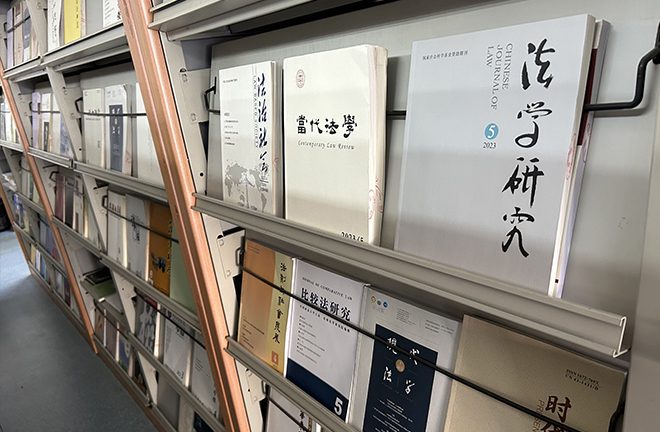Seminar probes digital justice and governance

Journals regarding legal science and social governance Photo: Yang Lanlan/CSST
At the Third Digital Justice Forum held in Beijing in December 2023, experts and scholars delved into the transition from traditional governance to digital governance within the context of Chinese modernization.
Digital justice
Digital justice is a proposed development goal by the Supreme People’s Court in the Opinions on Regulating and Strengthening the Application of Artificial Intelligence in Judicial Fields. Long Weiqiu, dean of the Institute for Advanced Studies in Humanities and Social Sciences at Beihang University (BUAA), said that under the guidance of the digital justice concept, national and social governance has undergone profound changes in the dimensions of philosophy, methods, means, and rules. The traditional governance system structure is in need of transformation and upgrade.
Shi Jianzhong, vice president of China University of Political Science and Law, believes that the public data open authorization mechanism should complement inclusiveness and openness. Additionally, a substantive fair competition review mechanism should be introduced. He emphasized that the government should adhere to the original intention of open access to government data to support the construction of a “digital China.”
The rapidly growing AI industry has brought about governance challenges in terms of speed, breadth, and depth, according to Li Zheng, vice president of the Central University of Finance and Economics. A logical, independent knowledge system is essential for the legal construction of AI.
Huang Zhixiong, deputy dean of the School of Law at Wuhan University, called for increased attention to the evolving national stance in cyberspace for taking a more proactive role in shaping international rules in this domain.
Su Yu, a professor from the Law School at the People’s Public Security University of China, emphasized the constraints faced by the existing government data security system in terms of security costs, technical capabilities, utilization demands, and management levels, and advocated for the establishments of an integrated and dynamic government data security protection mechanism.
Digital technology is transforming people’s social life from multiple perspectives. Zhao Jingwu, deputy director of the Digital Justice Research Center at BUAA, suggested employing the interest balance theory as the basis for identifying the legitimacy boundary of facial recognition technology application, with a focus on the impact of technological application on the entire hierarchy of interests. In the digital age, the protection of minors in online environments possesses unique characteristics such as earlier intervention points, offline diffusion, and wide-ranging influence surfaces, Zhao continued.
Peng Haiqing, a professor from the School of Law at the Beijing Institute of Technology, highlighted the significance of the Law on Family Education Promotion in regulating “healthy internet access.”
Judicial transformation
Judicial transformation in the digital age represents a key topic of concern for the experts in attendance. Ma Changshan, director of the Digital Rule of Law Research Institute at East China University of Political Science and Law, emphasized the importance of judicial restraint in four aspects: the legal boundaries of data operations, the practical dilemmas of algorithmic decision-making, digital humanistic spirit, and technological risk control. He also highlighted the significance of leveraging digital justice in the reconstruction of social order and the supervision of algorithmic decision-making audits. It is essential to optimize digital judicial construction by establishing the concept of digital rule of law, constructing a digital regulatory system, exploring digital important procedures, and safeguarding the minimum digital rights.
Hu Ming, dean of Guanghua Law School at Zhejiang University, proposed that the revision of the Criminal Procedure Law of the People’s Republic of China should fully reflect the digital transformation needs of criminal procedures in areas such as big data investigation, digital prosecution, and online litigation, while adhering to the basic principles of criminal litigation and the fundamental requirements of fairness and justice.
Zhai Zhiyong, a professor from the School of Law at BUAA, advocated for addressing the issue of data circulation via common law and establishing data rights through case-by-case review.
Crime governance in the digital era is characterized by the gradual blurring of boundaries between crime prevention and crime control, the challenge to sovereignty-based jurisdictional systems, as well as the imbalance between governance measures and the protection of citizens’ basic rights and the highly technical means of crime. Pei Wei, executive director of the Digital Justice Research Center at BUAA, called for the transition from post-event crackdown to pre-treatment in future crime governance. She emphasized strengthening domestic law’s extraterritoriality and international cooperation, and deepening public-private partnerships.
The coordination of domestic and international rule of law needs to align domestic procedures well with international conventions, echoed Liang Kun, dean of the School of Criminal Investigation at Southwest University of Political Science and Law.
The copyright protection of works generated by AI should be considered in relation to its training or input data. This inspires us to use the copyright system as an institutional tool and clarify the specific functions of various copyright systems, concluded Ding Xiaodong, a professor from the Law School at Renmin University of China.
The conference was hosted by the School of Law at BUAA.
Edited by YANG LANLAN

 PRINT
PRINT CLOSE
CLOSE